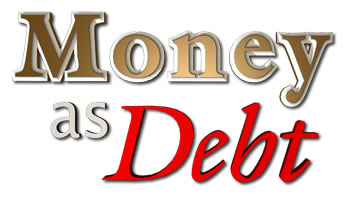
Solution page 7:
11 Advantages
1. Selling Producer Credits for conventional money relieves the "twice-lent money" problem of the current system. Money that would have been tied up in savings and unavailable to the original borrower to earn, is, instead, spent on Producer Credits, which are investments in short term production. The bank credit is returned to circulation free of any second debt-of-itself and, theoretically at least, available to be earned by its original borrower.
2. Creation of the “money supply” would be by those who produce what we want to buy. ONLY those who produce what is reliably in demand get to spend credit before it is earned. This allows anyone with something in demand, including individuals, to spend their own self-issued credit with whomever will accept it. It is only to be expected that, because we pay taxes to governments and buy the products of large corporations, the Credits of governments and corporations would naturally predominate in general circulation. However, it would also be perfectly possible to have any number of limited circulations on a city, village or even personal basis voluntarily connected as we do now on a natural "tribes" basis through social media.
3. Efficient. Producer Credits must ultimately be spent on the Issuer’s product or become worthless. As well, Issuers would be required to provide the full purchasing power to absorb their full production. This would tend to favor a full clearing of production, leaving no wasteful unsold excess.
4. No legacy of debt. Money as Producer Credits would be mortal like all things in nature. Born from a promise that is either fulfilled or expires unfulfilled, Producer Credit money would not depend on indebting individuals, now or in the future. Unlike the current system which depends on a legacy of debt, this form of money creation could not, by itself, create one.
5. Inflation-proofed savings. Despite the temporary nature of Producer Credits, wealth could be stored in them indefinitely, insulated from monetary inflation/deflation. Producer Credits can be held until early maturity and then traded for newer Credits. This process of rolling over Producer Credit savings could be automated by brokerage services. Being viewed as a reliable Producer Credit for savings would be desirable to any Issuer.
6. Informative. The patterns of Producer Credit trading and saving would yield valuable predictive information about customer preferences, and confidence in Issuers, providing economists with useful work in reading this information and predicting the right course of action for Issuers. This information would be anonymous on the personal level.
7. Voluntary. Because all Producer Credits must be refused by default, acceptance would always be voluntary. It would be possible for anyone to refuse to accept payment in any particular Issuer’s Producer Credits. This provides the general populace with an additional means of exercising market-based "direct democracy". The customers can pass judgment on an Issuer for practical reasons such as doubt in the reliability of its Credits, or ethical ones, such as the Issuer's objectionable social and environmental behaviors.
8. Stable. With no no debt owed in anything but
product or service, the only cause of Issuer failure is failure to deliver the product or service. There is no structural imperative to continually expand the supply of "money" due to moneylending arithmetic, and no creditors to go bankrupt to except the people holding your Credits. Small losses may be harmlessly absorbed by many Credit holders, all of whom voluntarily accepted that Issuer's Credit. Although expansion is always more enjoyable than contraction, the supply
of Producer Credits could just as gracefully contract as expand. There is no built-in growth imperative, and no house of cards to
collapse in default, as with the bank credit system.
9. Inclusive. Issuers would not only be made capable of creating enough purchasing power to absorb their own product they would clearly be responsible for doing so. This could lead to the possibility that profit realized by the technological replacement of labor could be used to pay that labor to perform necessary but non-commercial activities, such as environmental cleanup, or any manner of culturally advantageous services. Advances in production techniques could free people to do what they believe in.
10. Abundant. Mortgages would be entirely different. Downturns would be automatically corrected without government intervention. It is amazing what would be possible if the arithmetic were to be reversed.
The fundamental difference between the scarcity model and the abundance model is best illustrated by an examination of long term debt, particularly this short chapter on Mortgages.
11. Self-correcting. It would be possible to police the credit issuance of all Issuers to keep it in line with real demand, by a means of an automated market applying a simple formula.